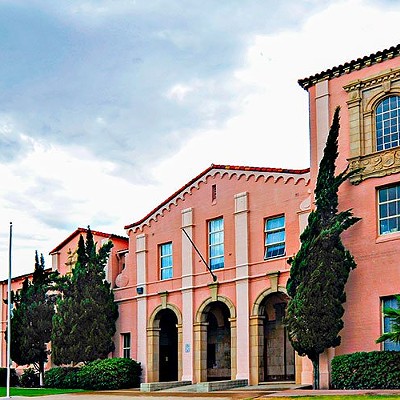On this day, Burns is headed to one of the dozens of TUSD committees and advisory boards on which she has served since the mid 1980s.
In early January, she'll take a place on the ultimate TUSD board as a shoo-in with no competition. No signs to put out this year. No forums to preach to. No door-to-door walking.
Burns, who knows how to save money, is operating as she has in the past, with a $500 or less campaign that allows her to save the trouble of financial-report paperwork. In contrast, Mary Belle McCorkle, 66, the board's current president who wants a third term, has raised $7,863 for her non-race. Along with Joel T. Ireland, 46, who already has served three terms, Burns and McCorkle have no opposition for the three TUSD board seats on the November 7 ballot. It is the first time since 1984 that voters in TUSD have had no choice.
"We looked at (running), but there wasn't enough support," said Jesus Zapata, a two-time candidate for the TUSD board.
Jan Lesher, the political consultant, is running McCorkle and Ireland as a package. "And we may actually win," Lesher jokes.
Media attention to other districts, particularly Amphi and Tanque Verde, has shifted focus away from TUSD, Lesher says, and some potential candidates regard the unpaid TUSD positions as thankless and overwhelming.
The dearth of contested races in Southern Arizona's largest school district, with its 63,000 students, contrasts starkly with Burns' previous runs. She came in third out of nine candidates two years ago when only two seats were up for grabs, fourth out of seven in 1996 when three seats were contested, and last in 1994 when four candidates competed for two seats and in 1992 when six ran for three positions.
But low-key persistence has finally rewarded Burns, 51. In January she will replace James Noel Christ, who after two terms on the board is coveting a TUSD administrator's position to replace the one he commutes to in Tempe.
"I'm real ready," Burns says. "Someone has told me that the learning curve will be flat for me given all my years of service. I already know who's who and what's what.
"It all starts with teachers in the classroom. I want to make it attractive to go into the teaching profession," says Burns, who attended community college in Michigan before moving to Tucson nearly 30 years ago. "I want to make it attractive for teachers to be in TUSD and attractive to stay with us."
Burns jokes that she'll miss the gatherings of parents, TUSD insiders, union officials and others in the lobby and outside TUSD headquarters when the board is cloistered in long and tedious executive sessions.
As one of the outsiders, Burns found she discovered "so much information."
It was as an outsider, a parent fighting an often intransigent and even belligerent school district, that Burns came to the forefront. She was a key activist in the movement in 1993 and 1994 to keep mid-city Catalina High School open. Ireland pushed hard to close it to open a southwest high school.
Among the issues that infuriated Burns was the inflated price TUSD paid for the radon-plagued southwest site then owned by the DeConcini family. To add to the controversy, the law firm DeConcini McDonald Yetwin & Lacy provides TUSD with key legal advice and representation.
Burns and others also complained that Ireland's real estate agent brother was peddling property and homes in that southwest neighborhood.
Ireland, a lawyer since 1990, was combative. In his second term he evaded a recall effort when the petition drive faltered. But he also took the offensive, even questioning the competence of U.S. District Court Judge Alfredo C. Marquez, who ruled that TUSD could not legally close Catalina under its 1978 desegregation order.
Despite this history of conflict, Burns insists she will begin her new role with a positive outlook. The two discussed just that when she reached out to Ireland when it became clear that this year's election was an automatic three-for-three.
"I called him and told him that I wanted him to know that I would start with a clean slate," Burns says. "I don't play games. And I'm not aligned with anyone."
That's not because of a lack of wooing, at least on the part of McCorkle, a former TUSD administrator who has experience in the workings of pure politics. According to one TUSD official, McCorkle has softly lobbied Burns, including taking her by the hand at a back-to-school function at one high school to introduce her around.
For his part, Ireland says he "actually had a very pleasant talk" with Burns. "I'm taking it at face value. Having been on the board as long as I have, I see new members come in and be amazed when they see the width and breadth of the responsibilities."
Burns has a son who graduated from Tucson High School and a daughter who is a sophomore at Tucson High. She and her husband, both extremely proud of their daughter's academic success, joke that they created, improbably, a cheerleader.
The case of Burns' son highlights many of the frustrations Burns has had with TUSD's huge and often stumbling bureaucracy. Though her son transferred to Tucson High from Rincon High School and was there from the start of the fall semester, TUSD officials listed him as a dropout and phoned the Burns household five months into the school year to find out where her son was.
"We expect excellence from our teachers; we need to demand it from administrators," Burns says.
Burns is pleased with TUSD's new superintendent, Stan Paz.
"He seems eager to do things and to do things right. I think it was meant to be that I lost all those times," Burns says in reference to having to work with Paz's predecessor, George Garcia. Seen as aloof, arrogant and wasteful in using school funds for lavish dinners, lunches and gifts, Garcia involved himself in the politics of the board to the point of recruiting and prepping candidates.
Burns says Garcia helped inflate TUSD's controversial desegregation budget.
"When I first looked at it, it was $8 million. Now it is more than $50 million. I haven't said 'Eliminate it,' but there are problems. I hate seeing things in the deseg budget like utilities that we'd clearly be paying anyway or for the salary of administrators that we would be paying anyway. There is a perception or question of is a slush fund or is it necessary?" Burns says.
It is that dramatic rise in the desegregation budget, among other expenditures, that has driven TUSD's property taxes up 34 percent since Ireland joined the board. The bill for the average homeowner has gone from $477 in 1988 to $656 this year, a 37.5 percent increase. For small businesses--for example, those with property assessed at $100,000--the bill has gone from $1,690 in 1988 to $2,262 this year.
But with uncontested races, taxes are little worry to the candidates.
"I don't want to seem flip about taxes, but my main concern is not taxes but having enough money for kids," Ireland says. "Nobody wants high taxes, but my first question is, is it necessary for educating our kids?"
The TUSD race, like other school board elections, is non-partisan. For the record, the party balance will not shift. Burns is a Democrat who is replacing a Democrat. Ireland and McCorkle are Democrats. Board members Carolyn Kemmeries and Rosalie Lopez are Republicans.
This year's muted campaigns are not unlike the past contested races in that they are an intramural affair: TUSD employees dominate Ireland's and McCorkle's nominating petitions. For example, Paul Felix, who needed Ireland's vote two years ago to be promoted to the second position in TUSD human resources, was the first to circulate an Ireland petition.
Ireland has kept his expenses low. He has raised $655, including $320 from his son Aaron. Expenditures of $500 have mostly gone to his ex-wife and political consultant Jan Lesher. One expense lists a phone survey for a bargain-basement price of $187.50.
Lesher says that is a mistake, that there was no phone survey and the expense report will be corrected in an amended report.
Meanwhile, McCorkle was off and running thinking she'd have opposition. At least a fourth of her contributions come from TUSD employees. In contrast, the city and Pima County prohibit employees from contributing money to, respectively, City Council candidates and candidates for county offices, to avoid inappropriate political pressure on employees.
Lesher said that McCorkle has given the bulk of the contributions to her race, $5,000, to the committee that is supporting Proposition 301, which proposes a .06 cent increase in the state sales tax to raise money for education statewide.












